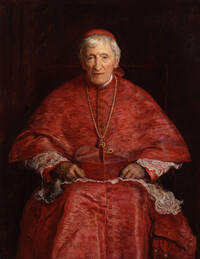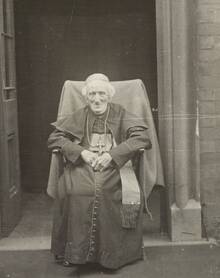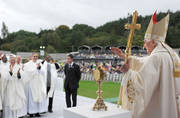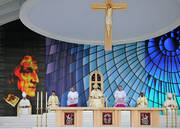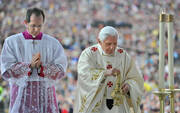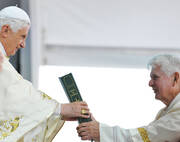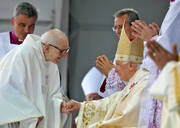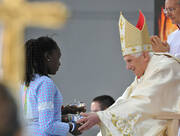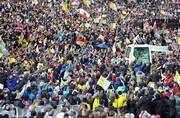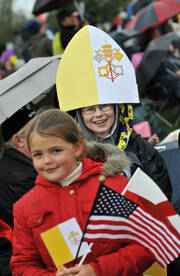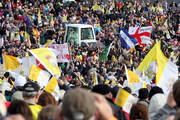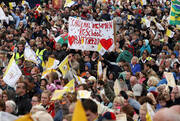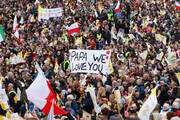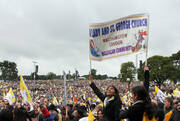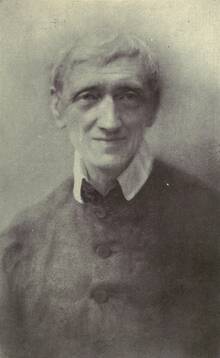Saint John Henry Newman
Theologian & poet, Cardinal - from England
Born in London on 21 February 1801
Ordained in the Anglian Church on 29th May 1825
Received into the Catholic Church by Bl Dominic Barberi on 9 October 1845
Ordained Catholic priest on 30 May 1847
Created Cardinal by Leo XIII on 12 May 1879
Motto - "Cor ad cor loquitur" (Heart speaks unto heart)
Died in Birmingham on 11 August 1890
Beatified in 2010 in Birmingham by Benedict XVI
Canonized on 13 October 2019 by Pope Francis
Feast Day - 9th October
Cardinal Newman's Prayer
Dear Lord, help me to spread Thy fragrance everywhere I go.
Flood my soul with Thy spirit and life.
Penetrate and possess my whole being so utterly that all my life may only be a radiance of Thine.
Shine through me and be so in me that every soul I come in contact with may feel Thy presence in my soul.
Let them look up and see no longer me but only Thee, O Lord!
Stay with me, and then I shall begin to shine as Thou shinest; so to shine as to be a light to others.
The light O Lord will be all from Thee; none of it will be mine;
It will be Thou, shining on others through me.
Let me thus praise Thee in the way Thou dost love best, by shining on those around me.
Let me preach Thee without preaching, not by words but by my example, by the catching force, the sympathetic influence of what I do, the evident fullness of the love my heart bears to Thee!'
(This is recited daily by Mother Teresa's Sisters of Charity)
3 2us by Father Ed Tomlinson ![]()
"Newman declared that he couldn't convert until someone walked barefoot from Rome to convert him. Elsewhere, in Italy .. another inspirational character, Bl Dominic Barberi, was praying for England with a truly missionary heart. He had received visions from Our Lady & told he must love this nation, which he came to do. And so, with barely a word of English, he approached the Vatican, asking permission to establish a Passionist order in this place. On a bleak October day, this rather shabby little monk arrived at Folkestone... Having corresponded with Newman some years previously, he decided to make for Oxford & as he entered Newman's lodgings, soaked from the rain of a terrible storm & his sandals removed, Newman realised with incredible awe that the Holy Spirit was at work. Here he was, Newman, & he was facing one who had come barefoot from Rome. Newman fell to his knees & there at the hands of Blessed Dominic he was received into the holy Catholic Church."
3 2us by Father Ian Ker ![]()
"When the Catholic Church canonizes somebody they're talking about heroic virtue, heroic sanctity, that a person was heroic, they're not talking about somebody being faultless. I think sometimes people used to say 'O well, Newman had this fault & that fault, so he couldn't be a saint.' That's actually not relevant because no-one is perfect & indeed all the saints have faults. What the Church is looking for is a heroic quality, it's not looking for impeccability, it's looking for heroism & Newman heroically followed the kindly light of truth through his life."
Pope Benedict XVI's homily at Holy Mass &
the beatification of Cardinal Newman 
Cofton Park Birmingham, Sunday 19th September - also in French, German, Italian, Portuguese & Spanish
"Dear Brothers and Sisters in Christ,
This day that has brought us together here in Birmingham is a most auspicious one. In the first place, it is the Lord’s day, Sunday, the day when our Lord Jesus Christ rose from the dead and changed the course of human history for ever, offering new life and hope to all who live in darkness and in the shadow of death. That is why Christians all over the world come together on this day to give praise and thanks to God for the great marvels he has worked for us. This particular Sunday also marks a significant moment in the life of the British nation, as it is the day chosen to commemorate the 70th anniversary of the Battle of Britain. For me as one who lived and suffered through the dark days of the Nazi regime in Germany, it is deeply moving to be here with you on this occasion, and to recall how many of your fellow citizens sacrificed their lives, courageously resisting the forces of that evil ideology. My thoughts go in particular to nearby Coventry, which suffered such heavy bombardment and massive loss of life in November 1940. 70 years later, we recall with shame and horror the dreadful toll of death and destruction that war brings in its wake, and we renew our resolve to work for peace and reconciliation wherever the threat of conflict looms. Yet there is another, more joyful reason why this is an auspicious day for Great Britain, for the Midlands, for Birmingham. It is the day that sees Cardinal John Henry Newman formally raised to the altars and declared Blessed.
I thank Archbishop Bernard Longley for his gracious welcome at the start of Mass this morning. I pay tribute to all who have worked so hard over many years to promote the cause of Cardinal Newman, including the Fathers of the Birmingham Oratory and the members of the Spiritual Family Das Werk. And I greet everyone here from Great Britain, Ireland, and further afield; I thank you for your presence at this celebration, in which we give glory and praise to God for the heroic virtue of a saintly Englishman.
England has a long tradition of martyr saints, whose courageous witness has sustained and inspired the Catholic community here for centuries. Yet it is right and fitting that we should recognize today the holiness of a confessor, a son of this nation who, while not called to shed his blood for the Lord, nevertheless bore eloquent witness to him in the course of a long life devoted to the priestly ministry, and especially to preaching, teaching, and writing. He is worthy to take his place in a long line of saints and scholars from these islands, Saint Bede, Saint Hilda, Saint Aelred, Blessed Duns Scotus, to name but a few. In Blessed John Henry, that tradition of gentle scholarship, deep human wisdom and profound love for the Lord has borne rich fruit, as a sign of the abiding presence of the Holy Spirit deep within the heart of God’s people, bringing forth abundant gifts of holiness.
Cardinal Newman’s motto, Cor ad cor loquitur, or 'Heart speaks unto heart', gives us an insight into his understanding of the Christian life as a call to holiness, experienced as the profound desire of the human heart to enter into intimate communion with the Heart of God. He reminds us that faithfulness to prayer gradually transforms us into the divine likeness. As he wrote in one of his many fine sermons, “a habit of prayer, the practice of turning to God and the unseen world in every season, in every place, in every emergency – prayer, I say, has what may be called a natural effect in spiritualizing and elevating the soul. A man is no longer what he was before; gradually he has imbibed a new set of ideas, and become imbued with fresh principles”. Today’s Gospel tells us that no one can be the servant of two masters, and Blessed John Henry’s teaching on prayer explains how the faithful Christian is definitively taken into the service of the one true Master, who alone has a claim to our unconditional devotion. Newman helps us to understand what this means for our daily lives: he tells us that our divine Master has assigned a specific task to each one of us, a “definite service”, committed uniquely to every single person: “I have my mission”, he wrote, “I am a link in a chain, a bond of connexion between persons. He has not created me for naught. I shall do good, I shall do his work; I shall be an angel of peace, a preacher of truth in my own place … if I do but keep his commandments and serve him in my calling.”
The definite service to which Blessed John Henry was called involved applying his keen intellect and his prolific pen to many of the most pressing “subjects of the day”. His insights into the relationship between faith and reason, into the vital place of revealed religion in civilized society, and into the need for a broadly-based and wide-ranging approach to education were not only of profound importance for Victorian England, but continue today to inspire and enlighten many all over the world. I would like to pay particular tribute to his vision for education, which has done so much to shape the ethos that is the driving force behind Catholic schools and colleges today. Firmly opposed to any reductive or utilitarian approach, he sought to achieve an educational environment in which intellectual training, moral discipline and religious commitment would come together. The project to found a Catholic University in Ireland provided him with an opportunity to develop his ideas on the subject, and the collection of discourses that he published as The Idea of a University holds up an ideal from which all those engaged in academic formation can continue to learn. And indeed, what better goal could teachers of religion set themselves than Blessed John Henry’s famous appeal for an intelligent, well-instructed laity: “I want a laity, not arrogant, not rash in speech, not disputatious, but men who know their religion, who enter into it, who know just where they stand, who know what they hold and what they do not, who know their creed so well that they can give an account of it, who know so much of history that they can defend it.” On this day when the author of those words is raised to the altars, I pray that, through his intercession and example, all who are engaged in the task of teaching and catechesis will be inspired to greater effort by the vision he so clearly sets before us.
While it is John Henry Newman’s intellectual legacy that has understandably received most attention in the vast literature devoted to his life and work, I prefer on this occasion to conclude with a brief reflection on his life as a priest, a pastor of souls. The warmth and humanity underlying his appreciation of the pastoral ministry is beautifully expressed in another of his famous sermons: “Had Angels been your priests, my brethren, they could not have condoled with you, sympathized with you, have had compassion on you, felt tenderly for you, and made allowances for you, as we can; they could not have been your patterns and guides, and have led you on from your old selves into a new life, as they can who come from the midst of you.” He lived out that profoundly human vision of priestly ministry in his devoted care for the people of Birmingham during the years that he spent at the Oratory he founded, visiting the sick and the poor, comforting the bereaved, caring for those in prison. No wonder that on his death so many thousands of people lined the local streets as his body was taken to its place of burial not half a mile from here. 120 years later, great crowds have assembled once again to rejoice in the Church’s solemn recognition of the outstanding holiness of this much-loved father of souls. What better way to express the joy of this moment than by turning to our heavenly Father in heartfelt thanksgiving, praying in the words that Blessed John Henry Newman placed on the lips of the choirs of angels in heaven:
Praise to the Holiest in the height
And in the depth be praise;
In all his words most wonderful,
Most sure in all his ways!
(The Dream of Gerontius)."
John Henry Newman's Prayer for Wisdom
Lord Jesus, teach me, like Mary, to sit at your feet, and to hear your word. Give me that true wisdom, which seeks your will be prayer and meditation, by direct communion with you, more than by reading and reasoning. Give me the discernment to know your voice from the voice of strangers, and to rest upon it and to see it in the first place, as something external to myself; and answer me through my own mind, if I worship and rely on you as above and beyond it.
Benedict XVI's Message to the International Centre on Newman Friends
- also in French, German, Italian, Portuguese & Spanish
To Reverend Father Hermann Geissler, FSO
Director of the International Centre for Newman Friends
While the joy of having been able to beatify Cardinal John Henry Newman during my recent visit to the United Kingdom is still alive within me, I address a cordial greeting to you, to the distinguished Relators and to all the participants in the Symposium organized in Rome by the International Centre of Newman Friends. I express my appreciation of the chosen theme: “The Primacy of God in the Life and Writings of Bl. John Henry Newman”. This theme rightly emphasizes theocentrism as a fundamental perspective which characterizes the personality and opus of the great English theologian.
It is well known that the young Newman, although he had come to know the “religion of the Bible” thanks to his mother, endured a period in his life full of difficulties and doubts. At the age of 14 he was influenced by philosophers such as Hume and Voltaire and, in identifying with their objections to religion, turned towards a kind of deism, in accordance with the humanist and liberal trends of that time.
Nevertheless, in the following year, Newman received the grace of conversion, finding repose “in the thought of two and two only absolute and luminously self-evident beings, myself and my Creator” (J.H. Newman, Apologia pro vita sua, Chapter 1. “History of My Religious Opinions to the Year 1833”). He therefore discovered the objective truth of a personal and living God, who speaks to the conscience and reveals to man his condition as a creature. He understood his dependence on the existence of the One, who is the beginning of all things, finding in him the origin and sense of identity and personal uniqueness. It is this particular experience that constitutes the base for the primacy of God in Newman's life.
After his conversion, he was guided by two fundamental criteria — drawn from the book The Force of Truth by the Calvinist Thomas Scott — which fully manifest the primacy of God in his life. The first: “Holiness rather than peace” (ibid.), which documents his determination to adhere to the interior Master with his own conscience, confidently abandoning himself to the Father and living in faithfulness to the recognized truth. These ideals were later to entail “a great price to pay”. In fact, Newman both as an Anglican and as a Catholic, was subjected to many trials, disappointments and misunderstandings. Yet, he never descended to false compromises or easy agreements. He always remained honest in his search for the truth, faithful to the promptings of his conscience and focused on the ideal of sanctity.
The second motto Newman chose was “Growth the only evidence of life” (ibid.), which completely expresses his willingness for continuous conversion, transformation and interior growth, always faithfully relying on God. Thus he discovered his vocation in service to the Word of God and, turning to the Fathers of the Church to find greater light, proposed a true reform of Anglicanism, adhering in the end to the Catholic Church. He summed up his own experience of growth in faithfulness to himself and to the Lord’s will in these well known words: “Here below to live is to change, and to be perfect is to have changed often” (J.H. Newman, An Essay on the Development of Christian Doctrine, Chapter 1, “On the Development of Ideas”). Newman, during his long life, was one who converted, who was transformed and in this way remained the same, becoming ever more himself.
The horizon of God’s primacy also deeply marks Newman's numerous publications. The cited essay on the Development of Christian Doctrine states: “That there is a truth then; that there is one truth;... the search for truth is not the gratification of curiosity; that its attainment has nothing of the excitement of a discovery; that the mind is below truth, not above it, and is bound, not to descant upon it, but to venerate it” (ibid., Chapter 8, “Application of the Third Note of a True Development—Assimilative Power”). The primacy of God is therefore expressed as the primacy of truth, a truth that must be sought first of all by orienting one's interiority to acceptance, in an open and sincere exchange with all, and that finds its culmination in the encounter with Christ “the Way, the Truth, and the Life” (Jn 14:6). Newman thus bore witness to the Truth also with his very rich literary production, ranging from theology to poetry, from philosophy to pedagogy, from exegesis to the history of Christianity, from novels to meditations and to prayers.
In presenting and defending the Truth, Newman was always careful to find the appropriate language, the correct form and a suitable tone. He tried never to offend others and to witness to the gentle inner light, the “kindly light”, forcing himself to convince others with humility, happiness and patience. In a prayer to St Philip Neri he wrote: “that my countenance may always be open and cheerful, and my words kind and pleasant, as becomes those who, in whatever state of life they are, have the greatest of all goods, the favour of God and the prospect of eternal bliss” (J.H. Newman, Meditations and Devotions, Novena of St Philip May 22, Philip's Cheerfulness).
I entrust to Bl. John Henry Newman, a master in teaching us, that the primacy of God is the primacy of the truth and of love, the reflections and work of this Symposium as, through the intercession of the Virgin Mary, Mother of the Church, I am pleased to impart to you and to all the participants the implored Apostolic Blessing, a pledge of abundant heavenly favours.
From the Vatican, 18 November 2010
BENEDICTUS PP. XVI
St John Paul II's address to the participants at the Symposium to commemorate the centenary of the death of John Henry Newman
Friday, 27 April 1990 - slso in Italian
"Your Eminences, Excellencies, my Brothers and Sisters in Christ,
1. I am very pleased that this meeting allows me to take part as it were in the Academic Symposium which the International Community "The Work" and the Centre of Newman Friends have organized to commemorate the centenary of the death of the renowned Cardinal John Henry Newman. I welcome all of you and thank you for drawing attention through your celebration to the great English Cardinal’s special place in the history of the Church. The passage of a hundred years since his death has done nothing to diminish the importance of this extraordinary figure, many of whose ideas enjoy a particular relevance in our own day. The theme of your Symposium, "John Henry Newman - Lover of Truth", points to a major reason for the continuing attraction of Newman’s life and writings. His was a lifelong pursuit of the Truth which alone can make men free (cf Jn 8, 32).
2. In this brief encounter I can mention only some of the many lessons which Newman holds out to the Church and to the world of culture. I would underline the inspiration that scholars and thoughtful readers of Newman continue to receive today from this pilgrim for truth. Your Symposium and other such celebrations during this centenary year offer the occasion for a deeper appreciation of Newman’s charism. Not least among his merits, he reminds us of the need for an interior disposition of loving obedience to God if contemporary society is to be successful in its quest for the full liberating truth which it urgently needs, and indeed knows itself to need.
Ever since his first "conversion grace" at the age of fifteen, Newman was never to lose his sense of God’s presence, his respect for revealed truth and his thirst for holiness of life. In his own lifetime, the example of his singular piety and integrity was widely esteemed throughout England by both Catholics and Anglicans alike. His reputation as a man of deep spirituality as well as of learning was one of the principal motives inspiring the English laity to petition Pope Leo XIII to raise the founder of the English Oratory to the College of Cardinals (cf Letters & Diaries of John Henry Newman, XXIX).
3. Newman’s intellectual and spiritual pilgrimage was made in earnest response to an inner light of which he seemed always aware, the light which conscience projects on all of life’s movements and endeavours. For Newman, conscience was a "messenger from Him, who, both in nature and in grace, speaks to us behind a veil" (Difficulties of Anglicans). It inevitably led him to obedience to the authority of the Church, first in the Anglican Communion, and later as a Catholic. His preaching and writings reflected his own lived experience. So, he could instruct his listeners: "Do but examine your thoughts and doings; do but attempt what you know to be God’s will, and you will most assuredly be led on into all the truth: you will recognize the force, meaning and awful graciousness of the Gospel Creed... " (Parochial and Plain Sermons, VIII, p 120).
Newman did not seek worldly success for his own sake, nor did he let the misunderstanding which often accompanied his efforts distract him from the search for true holiness, which was always his conscious aim. He enjoyed great influence and authority during his life, not for any office that he held but because of the human and spiritual personality which he portrayed.
4. The inner drama which marked his long life hinged on the question of holiness and union with Christ. His overriding desire was to know and to do God’s will. Thus, at a time of intense spiritual questioning, before retiring to pray about his decision to enter the Catholic Church, he asked his parishioners at Littlemore to "remember such a one in time to come, though you hear him not, and pray for him, that in all things he may know God’s will, and at all times he may be ready to fulfil it".
This ideal sustained him in the difficult hour when he sacrificed so much in leaving his beloved and familiar Church of England in order to enter the Catholic Church. His reasoned fidelity to the way God’s Providence led him made this experience - what he called the "hidden years" of his life - a source of encouragement and inspiration for many who were looking for the "port after a rough sea" (Apologia pro Vita Sua, p 238). With letters of spiritual direction and counsel he helped countless others along the path of the truth he himself had found and which filled him with so much joy. Newman’s influence in this sense has increased over the past hundred years and is no longer limited to England. All over the world people claim that this master of the spirit, by his works, by his example, by his intercession, has been an instrument of divine Providence in their lives.
5. In the contemporary cultural climate, with particular reference to Europe, there is an area of Newman’s thought which deserves special attention. I refer to the unity which he advocated between theology and science, between the world of faith and the world of reason. He proposed that learning should not lack unity, but be rooted in a total view. Thus, he concluded his Discourses before the University of Dublin with these striking words: "I wish the intellect to range with the utmost freedom, and religion to enjoy an equal freedom but what I am stipulating for is, that they should be found in one and the same place, and exemplified in the same persons."
In the present changing circumstances of European culture, does Newman not indicate the essential Christian contribution to building a new era based on a deeper truth and higher values? He wrote: "I want to destroy that diversity of centres, which puts everything into confusion by creating a contrariety of influences. I wish the same spots and the same individuals to be at once oracles of philosophy and shrines of devotion ..." In this endeavour the path the Church must follow in succinctly expressed by the English Cardinal in this way: "The Church fears no knowledge, but she purifies all; she represses no element of our nature, but cultivates the whole" (The Idea of a University, p 234).
6. Still another area of Newman’s spiritual itinerary stands out as particularly relevant in the wake of the Second Vatican Council. Because of it we feel Newman to be our true spiritual contemporary. The mystery of the Church always remained the great love of John Henry Newman’s life. And in this there is a further profound lesson for the present. Newman’s writings project an eminently clear picture of his unwavering love of the Church as the continuing outpouring of God’s love for man in every phase of history. His was a truly spiritual vision, capable of perceiving all the weaknesses present in the human fabric of the Church, but equally sure in its perception of the mystery hidden beyond our material gaze. May his memory inspire us to make our own the significant prayer that flowed so naturally from his heart: "Let me never forget that Thou hast established on earth a kingdom of Thy own, that the Church is Thy work, Thy establishment, Thy instrument; that we are under Thy rule, Thy laws and Thy eye - that when the Church speaks Thou dost speak. Let not familiarity with this wonderful truth lead me to be insensible to it - let not the weakness of Thy human representatives lead me to forget that it is Thou who dost speak and act through them."
7. May these same sentiments fill all our hearts as we commemorate this eminent churchman. In Newman’s entire experience we hear the echo of the words of Jesus to Nicodemus: "He who does what is true comes to the light, that it may be clearly seen that his deeds have been wrought in God" (Jn 3, 21). I trust that your Symposium will inspire further studies to bring out more clearly the importance and relevance of this "Lover of Truth" for our times.
Upon you and Newman scholars and friends everywhere I invoke the light of the Holy Spirit so that through your efforts the teachings of this great English Cardinal may be better known and appreciated. I gladly impart my Apostolic Blessing."
Presentation by Cardinal Joseph Ratzinger on 1st centenary of the death of Cardinal John Henry Newman
Rome, 28 April 1990 - in English, French, Italian & Portuguese
I do not feel competent to speak on Newman's figure or work, but perhaps it is meaningful if I tell a little about my own way to Newman, in which indeed something is reflected of the presence of this great English theologian in the intellectual and spiritual struggle of our time.
In January 1946, when I began my study of theology in the Seminary in Freising which had finally reopened after the confusion of the war, an older student was assigned as prefect to our group, who had begun to work on a dissertation on Newman's theology of conscience even before the beginning of the war. In all the years of his military service he had not lost sight of this theme, which he now turned to with new enthusiasm and energy. We were soon bonded by a personal friendship, wholly centred on the great problems of philosophy and theology. Of course, Newman was always present. Alfred Läpple - the name of the above-mentioned prefect - published his dissertation in 1952 with the title: Der Einzelne in der Kirche (The Individual in the Church). For us at that time, Newman's teaching on conscience became an important foundation for theological personalism, which was drawing us all in its sway. Our image of the human being as well as our image of the Church was permeated by this point of departure. We had experienced the claim of a totalitarian party, which understood itself as the fulfilment of history and which negated the conscience of the individual. One of its leaders had said: "I have no conscience. My conscience is Adolf Hitler". The appalling devastation of humanity that followed was before our eyes.
So it was liberating and essential for us to know that the "we" of the Church does not rest on a cancellation of conscience, but that, exactly the opposite, it can only develop from conscience. Precisely because Newman interpreted the existence of the human being from conscience, that is, from the relationship between God and the soul, was it clear that this personalism is not individualism, and that being bound by conscience does not mean being free to make random choices - the exact opposite is the case. It was from Newman that we learned to understand the primacy of the Pope. Freedom of conscience, Newman told us, is not identical with the right "to dispense with conscience, to ignore a Lawgiver and Judge, to be independent of unseen obligations". Thus, conscience in its true sense is the bedrock of Papal authority; its power comes from revelation that completes natural conscience, which is imperfectly enlightened, and "the championship of the Moral Law and of conscience is its raison d'être".
This doctrine on conscience has become for me ever more important in the continued development of the Church and the world. Ever more I see how it first opens in the context of the biography of the Cardinal, which is only to be understood in connection with the drama of his century and so speaks to us.
Newman had become a convert as a man of conscience; it was his conscience that led him out of the old ties and securities into the world of Catholicism, which was difficult and strange for him. But this way of conscience is everything except a way of self-sufficient subjectivity: it is a way of obedience to objective truth. The second step in Newman's lifelong journey of conversion was overcoming the subjective evangelical position in favour of an understanding of Christendom based on the objectivity of dogma. In this connection I find a formulation from one of his early sermons to be especially significant today: "True Christendom is shown... in obedience and not through a state of consciousness. Thus, the whole duty and work of a Christian is made up of these two parts, Faith and Obedience; "looking unto Jesus' (Heb 2: 9)... and acting according to His will.... I conceive that we are in danger, in this day, of insisting on neither of these as we ought; regarding all true and careful consideration of the Object of faith as barren orthodoxy, technical subtlety... and... making the test of our being religious to consist in our having what is called a spiritual state of soul".
In this regard some sentences from The Arians of the 4th century, which may sound rather astonishing at first, seem important to me: "...to detect and to approve the principle on which... peace is grounded in Scripture; to submit to the dictation of truth, as such, as a primary authority in matters of political and private conduct; to understand... zeal to be prior in the succession of Christian graces to benevolence". For me it is always fascinating to see and consider how in just this way and only in this way, through commitment to the truth, to God, conscience receives its rank, dignity and strength. I would like in this context to add but one sentence from the Apologia, which shows the realism in this idea of person and Church: "Living movements do not come of committees."
Briefly I would like to return to the autobiographical thread. When I continued my studies in Munich in 1947, I found a well read and enthusiastic follower of Newman in the fundamental theologian, Gottlieb Söhngen, who was my true teacher in theology. He opened up the Grammar of Assent to us and in doing so, the special manner and form of certainty in religious knowledge. Even deeper for me was the contribution which Heinrich Fries published in connection with the Jubilee of Chalcedon. Here I found access to Newman's teaching on the development of doctrine, which I regard along with his doctrine on conscience as his decisive contribution to the renewal of theology. With this he had placed the key in our hand to build historical thought into theology, or much more, he taught us to think historically in theology and so to recognize the identity of faith in all developments. Here I have to refrain from deepening these ideas further. It seems to me that Newman's starting point, also in modern theology, has not yet been fully evaluated. Fruitful possibilities awaiting development are still hidden in it. At this point I would only like to refer again to the biographical background of this concept. It is known how Newman's insight into the ideas of development influenced his way to Catholicism. But it is not just a matter of an unfolding of ideas. In the concept of development, Newman's own life plays a role. That seems to become visible to me in his well-known words: "...to live is to change, and to be perfect is to have changed often". Throughout his entire life, Newman was a person converting, a person being transformed, and thus he always remained and became ever more himself.
Here the figure of St Augustine comes to my mind, with whom Newman was so associated. When Augustine was converted in the garden at Cassiciacum he understood conversion according to the system of the revered master Plotin and the Neo-Platonic philosophers. He thought that his past sinful life would now be definitively cast off; from now on the convert would be someone wholly new and different, and his further journey would be a steady climb to the ever purer heights of closeness to God. It was something like that which Gregory of Nyssa described in his Ascent of Moses: "Just as bodies, after having received the first push downwards, fall effortlessly into the depths with ever greater speed, so, on the contrary, the soul which has loosed itself from earthly passion rises up in a rapid upward movement... constantly overcoming itself in a steady upward flight". Augustine's actual experience was a different one. He had to learn that being a Christian is always a difficult journey with all its heights and depths. The image of ascensus is exchanged for that of iter, whose tiring weight is lightened and borne up by moments of light which we may receive now and then. Conversion is the iter - the roadway of a whole lifetime. And faith is always "development", and precisely in this manner it is the maturation of the soul to truth, to God, who is more intimate to us than we are to ourselves.
In the idea of "development" Newman had written his own experience of a never finished conversion and interpreted for us, not only the way of Christian doctrine, but that of the Christian life. The characteristic of the great Doctor of the Church, it seems to me, is that he teaches not only through his thought and speech but also by his life, because within him, thought and life are interpenetrated and defined. If this is so, then Newman belongs to the great teachers of the Church, because he both touches our hearts and enlightens our thinking.
Sermon - The Tears of Christ at the Grave of Lazarus (PPS, vol. 3, no.10)
Martha said to him, "Yes, Lord. I have come to believe."
Christ went to raise Lazarus, and the fame of that miracle was the immediate cause of His seizure and crucifixion (Jn 11,46)... He felt that Lazarus was wakening to life at His own sacrifice; that He was descending into the grave which Lazarus left. He felt that Lazarus was to live and He to die; the appearance of things was to be reversed; the feast was to be kept in Martha's house (Jn 12,1f.), but the last passover of sorrow remained for Him. And Jesus knew that this reverse was altogether voluntary with Him. He had come down from His Father's bosom to be an Atonement of blood for all sin, and thereby to raise all believers from the grave, as He was then about to raise Lazarus; and to raise them, not for a time, but for eternity...
Contemplating then the fulness of His purpose while now going about a single act of mercy, He said to Martha, "I am the Resurrection and the Life: he that believeth in Me, though he were dead, yet shall he live, and whosoever liveth and believeth in Me, shall never die." Let us take to ourselves these comfortable thoughts, both in the contemplation of our own death, or upon the death of our friends. Wherever faith in Christ is, there is Christ Himself. He said to Martha, "Believest thou this?" Wherever there is a heart to answer, "Lord, I believe," there Christ is present. There our Lord vouchsafes to stand, though unseen—whether over the bed of death or over the grave; whether we ourselves are sinking or those who are dear to us. Blessed be his name! nothing can rob us of this consolation: we will be as certain, through His grace, that He is standing over us in love, as though we saw Him. We will not, after our experience of Lazarus's history, doubt an instant that He is thoughtful about us and that he stands at our side.
Sermons on Subjects of the Day (6) - Faith and Experience
"Upon this rock I will build my church, and the gates of the netherworld shall not prevail against it"
This was the perplexity of believers in the old time, as we read in the Psalms and Prophets, viz. that the wicked should prosper, while God's servants seemed to fail: and so in Gospel times. Not that the Church has not this peculiar prerogative with it, which no other religious body has, that as it began with Christ's first coming, so it will never fail till He comes again.
Nevertheless, for a time, in the course of single generations, nay, I may say in every age and at all times, it seems to be failing, and its enemies to be prevailing. It is the peculiarity of the warfare between the Church and the world, that the world seems ever gaining on the Church, yet the Church is really ever gaining on the world... Kingdoms rise and fall; nations expand and contract; dynasties begin and end; princes are born and die; confederacies are made and unmade, and parties, and companies, and crafts, and guilds, and establishments, and philosophies, and sects, and heresies. They have their day, but the Church is eternal; yet in their day they seem of much account...
Much there is to try our faith at this moment, who cannot see the future, and therefore cannot see the short duration of what shows proudly and successfully now. We at this day see a number of philosophies, sects, and parties, thriving and extending, and the Church seems poor and helpless... Let us pray God to teach us: we need His teaching; we are very blind. The Apostles on one occasion said to Christ, when His words tried them, "Increase our faith" (Lk 17,5). Let us come to Him honestly: we cannot help ourselves; we do not know ourselves; we need His grace. Whatever perplexity the world gives us... let us come to Him with pure and sincere minds; imploring Him to reveal to us what we know not, to incline our hearts when they are stubborn, and to make us love and obey Him honestly while we seek.
Blessed John Henry Newman - PPS 2,10
"The Lord whom ye seek shall suddenly come to His Temple;" (Mal 3:1) I say, we are today reminded of the noiseless course of God's providence, —His tranquil accomplishment, in the course of nature, of great events long designed; and again, of the suddenness and stillness of His visitations…
Now, there is evidently nothing great or impressive in this (scene); nothing to excite the feelings, or interest the imagination. We know what the world thinks of such a group as I have described. The weak and helpless, whether from age or infancy, it looks upon negligently and passes by. Yet all this that happened was really the solemn fulfilment of an ancient and emphatic prophecy. The infant in arms was the Saviour of the world, the rightful heir, come in disguise of a stranger to visit His own house. The Scripture had said, "The Lord whom ye seek shall suddenly come to His Temple: but who may abide the day of His coming, and who may stand when He appeareth?" (Mal 3:2) He had now taken possession. And further, the old man who took the child in his arms, had upon him the gifts of the Holy Ghost, had been promised the blessed sight of his Lord before his death, came into the Temple by heavenly guidance, and now had within him thoughts unutterable, of joy, thankfulness, and hope, strangely mixed with awe, fear, painful wonder, and "bitterness of spirit." Anna too, the woman of fourscore and four years, was a prophetess; and the bystanders, to whom she spoke, were the true Israel, who were looking out in faith for the predicted redemption of mankind…
"The glory of this latter House shall be greater than of the former,"(Hag 2:9) was the announcement made in another prophecy. Behold the glory; a little child and his parents, two aged persons, and a congregation without name or memorial. "The kingdom of God cometh not with observation." (Lk 17:20). Such has ever been the manner of His visitations… — silent, sudden, unforeseen, as regards the world, though predicted in the face of all men, and in their measure comprehended and waited for by His true Church…
And it is impossible that it should be otherwise, in spite of warnings ever so clear, considering how the world goes on in every age. Men, who are plunged in the pursuits of active life, are no judges of its course and tendency on the whole. They confuse great events with little, and measure the importance of objects, as in perspective, by the mere standard of nearness or remoteness… In every age the world is profane and blind, and God hides His providence, yet carries it forward.
Blessed John Henry Newman - Sermon "A Particular Providence as Revealed in the Gospel" (PPS vol. 3, 9)
God beholds thee individually, whoever thou art. He "calls thee by thy name" (Jn 10,3). He sees thee, and understands thee, as He made thee. He knows what is in thee, all thy own peculiar feelings and thoughts, thy dispositions and likings, thy strength and thy weakness... Thou art not only His creature (though for the very sparrows He has a care... ), thou art man redeemed and sanctified, His adopted son, favoured with a portion of that glory and blessedness which flows from Him everlastingly unto the Only-begotten.
Thou art chosen to be His... Thou wast one of those for whom Christ offered up His last prayer, and sealed it with His precious blood. What a thought is this, a thought almost too great for our faith! Scarce can we refrain from acting Sarah's part, when we bring it before us, so as to "laugh" from amazement and perplexity (Gen 18,12). “What is man”, what are we, what am I, that the Son of God “should be so mindful of me?” (Ps 8,5) What am I... that He should have... new-made me,... and should Himself dwell personally in this very heart of mine?

